- Home
- Jane Peart
Mirror Bride Page 2
Mirror Bride Read online
Page 2
Catching sight of her mother standing at the bedroom door with a reproachful expression on her face brought Cara to a standstill.
"Well, all right, Lily!" she sighed dramatically. "Go ahead, but do hurry up. Kip will be here in a few minutes and—"
Kitty had also seen Blythe. "Oh, Mama!" she called out. "You look so pretty in that dress."
"Thank you, darling. I'm glad you think so." Pleased, Blythe leaned down and patted her little daughter's cheek, then turned to admonish Cara. "Don't make such a fuss, Carmella, and stop making Lily cross. You're getting to be a young lady and so you must start acting like one, not wiggling and squirming like that."
"But, Mama, Lily's already done my hair once, and Kip will be here and I—"
"Don't argue. Just do as you're told. Later on, you can all watch the dancing from the balcony . . . that is—" and Blythe's voice took on a severe tone, directing the rest of her remark to Cara—"if you're good and behave yourself."
With this warning, Blythe returned to her room to get her fan and gloves before going downstairs. She must consult with the serving staff, see that there were no last-minute emergencies, and check the refreshment tables to be sure that everything was in readiness for the many expected guests.
The twins stationed themselves on the steps, their faces pressed between the spindles of the stairway. From this vantage point they could see the front door, not only to watch for their friends, Meredith and Kendall Montrose, but also to observe the arrival of their parents' elegantly attired guests. Half the fun, they thought privately, was seeing which of the ladies was most done up and which of the gentlemen was most courtly and handsome.
Although an "outsider" from California, her mother had embraced all Virginia's holiday traditions enthusiastically and incorporated them in decorating Cameron Hall at Christmas. Not only did she observe all those passed down by Rod's mother, Kate, but had studied books describing the customs of the early Colonials and had applied them with precision.
Looking about her now, Kitty loved Christmas, especially the decorations that transformed their house into a wonderland. Greens native to the Virginia countryside—pine, waxy magnolia leaves, soft red cedar, rosemary, and laurel—decked the halls, while fragrant garlands of spruce were looped down the stairway banister. At the landing hung a plaque centered with pomegranates, grapes, Seckel pears, and Jerusalem cherries. Red candles scented with bayberry were everywhere—in the chandeliers, at each window, and on the tree, having been lit only once, on Christmas Eve. Every mirror and window frame was adorned with holly bright with crimson berries and a red satin bow tied with streamers at the top. On the double front door, twin arrangements of cloved lemons in evergreen wreaths, embellished with pine cones and cotton pods, welcomed all comers.
The centerpieces on the long refreshment tables were works of art, carefully crafted by Blythe herself—great pyramids of polished red apples encircled by shiny laurel leaves and flanked by bouquets of poinsettias and tall red tapers in gleaming silver candelabra.
The Christmas tree, a twelve-foot cedar standing in its usual place in the entryway between the drawing room and dining room, dazzled the eyes of the beholder. Each year the trimmings seemed more imaginative and spectacular than the last. This year, glittering with gilt beads, the tree was hung with gold balls and colorful exotic birds perched on its branches. Glass bells tinkled merrily each time the front door opened, admitting a breeze.
Music from the quartet playing in the small room adjoining the parlor accompanied the mingling of voices lifted in holiday greetings and the hum of conversation. Soon there would be dancing, and Kitty would be lost in dreams of the distant day when she, too, in a beautiful dress, would be waltzing on the polished floor in the arms of a Prince Charming who would assuredly come to whisk her away.
Satisfied that everything was under control, Blythe took her place beside Rod in the elegant foyer to receive the guests now streaming through the front door that never seemed to close before another group arrived.
They had been receiving for perhaps a half hour when Jeff and Faith appeared. How stunning Faith looks, Blythe thought with affectionate pride as her daughter-in-law swept into the front hall. Tall and willowy, she was wearing a peacock blue gown that set off to perfection the dark, wavy hair and English rose complexion. She wondered if Jeff had designed the gown, as he often did Faith's dresses. Certainly he must have chosen the color, his sure artist's eye selecting what would be most becoming to his wife. Perhaps Faith should have the Montrose bridal set. She could certainly display it to advantage.
As the couple came up to exchange New Year's greetings, Faith embraced Blythe. Then, clasping both of Blythe's hands in her own, Faith leaned forward and whispered, "Oh, Auntie Blythe, I have the most marvelous news. Jeff and I . . . we're to have a child, a baby this summer!"
"Oh, my dear, I am so happy . . . for both of you." Blythe smiled back into Faith's shining eyes. "I thought you had a special sparkle about you this evening!"
"It's still a secret. We haven't told anyone else yet. Not even Mama. I plan to write her just as soon as the holidays are over."
"She'll be on the next ship!" Blythe laughed, thinking of her old nemesis, who was living in England with her publisher husband, Jeremy Devlin. How thrilled she would be with this news of her first grandchild. Or would she? Garnet had always been vain and a bit shallow. Perhaps she would feel she was much too young for grandchildren!
Faith rolled her eyes. "Oh, no, I hope not!" She blushed at her own slip, then added, "You know I adore her, but she does have a tendency to take over. And Jeff is working on a very important painting, so I don't want anything to disturb his concentration until it's finished."
Jeff took Faith's arm, while giving his mother a slow wink. "Come, darling wife. You made me promise I'd dance tonight, so let's get it over."
"Get it over—the idea!" Faith pretended indignation, then linked her arm with his, and they strolled off together.
Blythe gazed after them. What a handsome couple they made and what a beautiful baby they were sure to have. Suddenly a startling realization dawned. Fancy me about to become a grandmother when I still feel like a bride myself! Glancing up at the tall, splendid-looking man beside her, an amusing afterthought followed. Why, I'm in love with a grandfather! Somehow, that notion struck her as even more preposterous, and she started to feel a giggle bubble up inside.
"Now what are you smiling about?" Rod asked, frowning. "You look like the cat that swallowed the canary."
"It's a secret."
"A secret? I thought we weren't ever going to have any more secrets from each other. Wasn't that part of our wedding vows?" he demanded with mock severity.
Blythe was saved from a reply by the next flood of arrivals, and there wasn't a chance to tell Rod about Jeff and Faith's news.
Several times during the evening, she watched the young couple circling the floor, admiring the grace of their movements, observing the way they gazed into each other's eyes. Blythe remembered the first time she had seen them waltzing together. How startled she had been at the time to see how perfect they looked together. And how strange and rather frightening that her son and Garnet's daughter might someday fall in love and marry—the children of the two women who had both been in love with the same man. Life is incomprehensible.
Perhaps she should give Faith the Montrose rubies, for Jeff was just as much a Montrose as Jonathan. When Jonathan's mother, Rose, had died, Blythe, as Malcolm's second wife, had been the logical one to have them. By the same token, Faith was eligible to receive them now.
Almost on the heels of Blythe's thoughts, Jonathan and Davida arrived. In contrast to Faith, Davida looked diminutive and fragile in a pearl-gray taffeta. Still, she was very attractive with her delicate features and wide eyes.
As Blythe went forward to greet her latest guests, she noticed that Davida was wearing the stunning diamond snowflake pendant that had belonged to Jonathan's mother, Rose. The sight of it eased her
conscience a bit as to the possible disposition of the family heirlooms. Certainly the current mistress of Montclair did not lack for beautiful adornment and should have nothing to complain about.
On the contrary, however, the first words out of Davida's mouth were laments about the icy roads and the freezing weather, accompanied by her rueful glance at Jonathan as if he were somehow to blame. Surely winters in Davida's native Massachusetts must be worse than Virginia winters, Blythe could not help thinking.
She studied the couple. Was Davida unhappy? The next silent question followed the first. Was Jonathan? Blythe couldn't be sure. For all her good intentions, in the ten years since they had become neighbors, Blythe had never been able to get very close to either of them. Not that she had really tried, she thought with some guilt.
Perhaps it was her fault. Was there some inner resistance on her part? Jonathan resembled the young Malcolm to an uncanny degree. Was there, therefore, some hidden resentment in Blythe that prevented her getting to know and love Malcolm's other son?
Much, she knew, lay unspoken between them—most obviously, the fact that Jonathan was the son of Malcolm's first marriage, and Jeff was the son of Malcolm's second bride. Jeff had never known his father, and since coming to Virginia to make his home, the two young men had managed to gain a mutual respect for one another without ever really forging a strong fraternal bond. Perhaps too many barriers separated them, thought Blythe, not the least of which were the circumstances of their birth and having grown to manhood in different countries and developing different values, different goals.
Jonathan was now a gentleman farmer, overseeing Montclair after it had been deeded to him by his cousin, Drucilla Bondurant; and Jeff was pursuing his art at Avalon, the home where he had lived with Blythe until her marriage to Rod Cameron.
Almost as if thinking of Dru had precipitated her arrival, she appeared on the arm of her husband, the man who had won Montclair from Malcolm in a card game. Even now it was difficult for Blythe to be polite to Randall Bondurant, but her role as hostess demanded a charming and gracious welcome. Besides, she sincerely liked Dru.
While not beautiful, Dru had the proud carriage, the aristocratic features of the Montrose family. Since her marriage to a worldly, well-traveled man, she had also achieved a certain sophistication, a glamor and style, Blythe thought, admiring her ermine-banded velvet evening cape and the superbly beaded gown of ice-blue satin she was wearing.
The instant that Dru spotted Jonathan, she hurried toward him with a glad cry of greeting. The two, who had grown up together at Montclair during the War, had always been close. They hugged and then Dru embraced Davida, too, before coming to greet Blythe and Rod.
"Is so wonderful to be here and to see everyone!" she exclaimed.
"Where's Aunt Dove?" was Rod's first question, referring to Dru's mother, whom they had come from Charleston to visit for Christmas.
"Oh, Evalee had the sniffles, and Mama elected to stay home and keep her company. They were snuggled up reading The Twelve Dancing Princesses when we left. You know, Mama is the dotingest grandmother in the world!" Dru explained, laughing. "But Evalee was disappointed not to see the twins and Scott, of course."
"Yes, that is too bad," Blythe fibbed, knowing that her twins considered Evalee Bondurant a "spoiled bra' and would be mightily glad that she had not come.
Hearing this, the twins, who were sitting on the steps just beyond the curve of the stairway, exchanged exaggerated sighs of relief.
The two Montrose children had arrived with their parents and stood waiting beside them. To Blythe's eye, Kendall, nicknamed Kip, a handsome, rosy-cheeked lad of eleven, quite overshadowed his younger sister, Meredith, a plain-looking little girl with straight, light brown hair and wistful hazel eyes. She was quiet and shy, with none of her mother's prettiness nor her father's outgoing charm, and seemed destined to walk in her more outgoing brother's shadow.
Seeing their friends, the twins dashed down the steps to meet them, Cara tugging at Kip's sleeve and Kitty taking Meredith's hand.
"I've got a wonderful idea! Just wait 'til you hear!" Cara told Kip.
Kip eyed Cara warily. Cara was great fun, and he was usually willing to go along with any suggestion she made. But there were times he'd regretted it—like the time he'd broken his arm jumping from the shed roof—
"What kind of idea?" he asked.
"I'll tell you in a minute, but first you've got to promise to keep it a secret."
Kip glanced up and caught Scott Cameron at the top of the steps, leaning over the banister as the four other children approached.
At twelve, Scott felt much too old to join in games with his sisters and their friends, but tonight had the potential of being tediously boring since the younger generation would be confined to the upstairs for the most part. If nothing more interesting developed, he would retreat to his room to read one of the new books he had received for Christmas.
As much as Kip liked Cara, his masculinity was in the balance now that he had seen Scott. If there was an option tonight, he'd rather be with the older boy. So, until Scott indicated what he was going to do, Kip decided to reserve his decision.
"Wait 'til you see the dollhouse we got, Merry," Kitty was telling Meredith. "It looks just like our own real house outside, but it's got different kinds of rooms and furniture and a little family of dolls that goes inside."
Kip turned to Cara with a disgusted look. "Is that what you wanted to show me?"
"A silly old dollhouse? Of course not! Come on." And Cara proceeded to drag him down the hallway.
Overhearing this exchange, Scott raised his eyebrows, evidently coming to the conclusion that whatever the others were going to do didn't interest him. So, putting his hands in his jacket pockets, he sauntered nonchalantly in the other direction to his own room, leaving Kip to throw in his lot with Cara for the evening.
Kitty and Merry had disappeared into the nursery where the miniature three-story replica of Cameron Hall was set up, and the two little girls were immediately involved in the make-believe lives of the dollhouse family.
"Now what die's secret?" Kip demanded.
Cara put her finger to her lips. "We've got to be real careful. Follow me."
She tiptoed down to the end of the hall where her parents' suite was located, an area of the house usually off limits to the children, though they had violated that restriction more than once.
Easing open the door to Blythe's small sitting room adjoining the master bedroom, Cara beckoned Kip forward and asked in a stage whisper, "Cross your heart and hope to die?"
"Sure."
"'Member last Saturday at your house?"
He nodded vigorously, eyes alight in anticipation.
The week before, when looking for a place to hide while they were playing "Sardines" at Montclair, Cara and Kip had accidentally discovered a hidden panel in the now unused nursery. Inadvertently, Cara had leaned against the wall and sprung a concealed hinge that released the lock. To their astonished eyes, the panel had slid back, revealing a secret room. Creeping inside, they had found another door that led down some narrow steps to an underground passage. Swearing secrecy, they had emerged, covered in cobwebs and dust, determining that when the weather was better and the opportunity presented itself, they would follow it to see where it led. Both had felt the thrill of fear along with a heightened sense of adventure. Sharing such a momentous secret had strengthened their bond of friendship even more.
"Well, my idea is this—" Cara began. "Next time I'm over at Montclair, we'll find a way to go up to the nursery again, slide back the door, and . . . put a time capsule in there—"
"A time capsule?"
Yes, you know the kind people bury and don't dig up or open for years . . . sometimes even a hundred years—"
"A hundred years?"
"Well, it doesn't have to be that long. Maybe, twenty—"
'Twenty?"
Cara gave a sigh of disgust. "Kip, you're repeating everything I sa
y! Anyway, we'll put all sorts of things in it. You know, tomorrow will be 1900, Kip! Can't you just imagine what it will be like twenty years from now when our time capsule is opened up?"
"What sorts of things would we put in it?" Kip asked cautiously, hoping it wouldn't mean giving up some of his new Christmas presents.
"They should be important things—secret things. Documents, sort of."
"Uh . . . what do you mean?"
"Documents like . . . ummm, maps, certificates—"
"Certificates?"
"Oh, Kip, use your imagination, can't you?" Exasperated, Cara put her hands on her hips.
"Sure, but I don't have any certificates."
Cara's eyes grew very big and she leaned closer. "Well, I do!" She waited for his reaction. "At least, I know where some are. And that's my secret. But you've got to promise you'll never tell anyone what I'm about to show you."
"I promise," he agreed solemnly, now thoroughly intrigued.
"Say it then. Repeat after me: I, Kip Montrose, choose to be hung by my thumbs from the tallest tree if I ever tell what I'm about to see."
Kip, excited now, rattled off the pledge.
"Now, I'll show you," Cara declared. "See that desk?" She pointed to the graceful fruitwood desk with inlaid marquetry. "It's my mother's now, but it used to belong to your great-grandmother, Sara Leighton. It has her initials carved underneath and 'Savannah, 1820'."
Kip looked impressed.
"My mother found it in an antique shop and bought it," Cara told him. "But that isn't the best part. It has a secret drawer. Here, I'll show you." She went over and ran her chubby hand along the underside, and a small drawer slid open. "And here is an important document—something we could put in our time capsule," she crowed triumphantly.
"But wouldn't your mother find out? I mean, wouldn't she miss it if she's hidden it?"
"She's probably even forgotten she has it. Besides, it should be preserved for history in our time capsule. Here, read it." Cara handed him a folded parchment, yellowed with age.

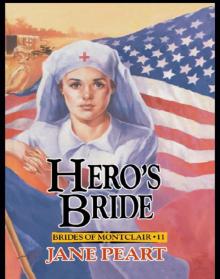 Hero's Bride
Hero's Bride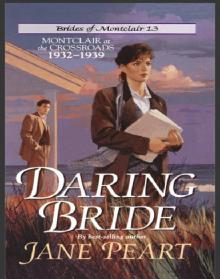 Daring Bride
Daring Bride Runaway Heart
Runaway Heart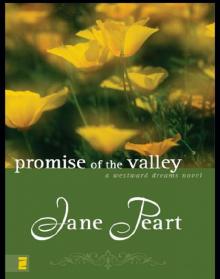 Promise of the Valley
Promise of the Valley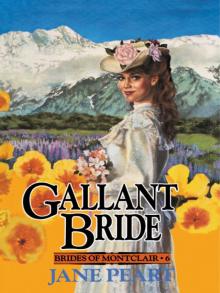 Gallant Bride
Gallant Bride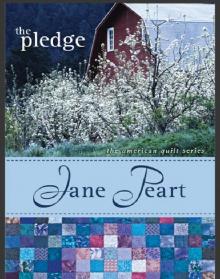 The Pledge, Value
The Pledge, Value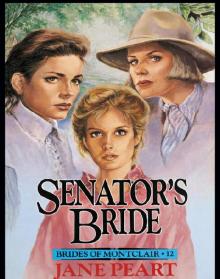 Senator's Bride
Senator's Bride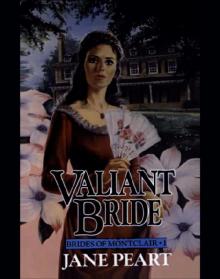 Valiant Bride
Valiant Bride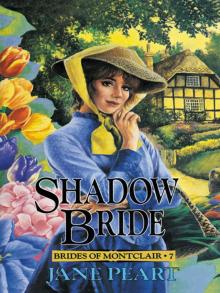 Shadow Bride
Shadow Bride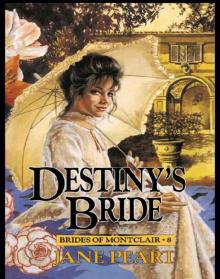 Destiny's Bride
Destiny's Bride A Tangled Web
A Tangled Web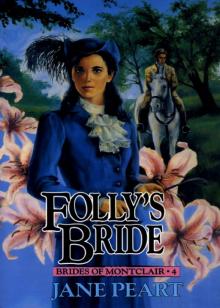 Folly's Bride
Folly's Bride The Promise
The Promise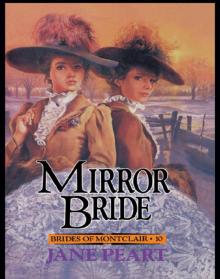 Mirror Bride
Mirror Bride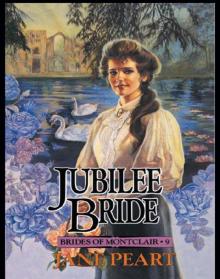 Jubilee Bride
Jubilee Bride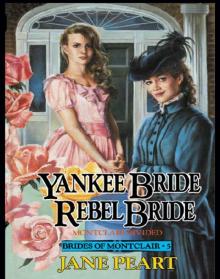 Yankee Bride / Rebel Bride
Yankee Bride / Rebel Bride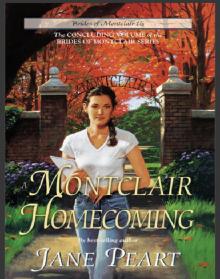 A Montclair Homecoming
A Montclair Homecoming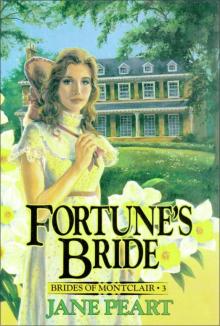 Fortune's Bride
Fortune's Bride Undaunted Spirit
Undaunted Spirit Love Takes Flight
Love Takes Flight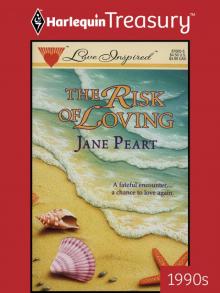 The Risk of Loving
The Risk of Loving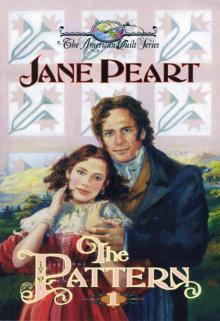 The Pattern
The Pattern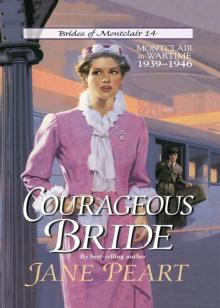 Courageous Bride
Courageous Bride